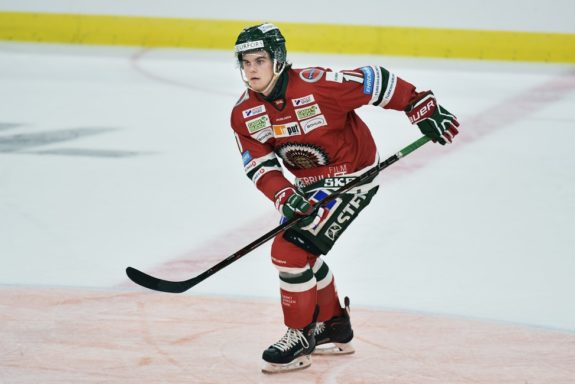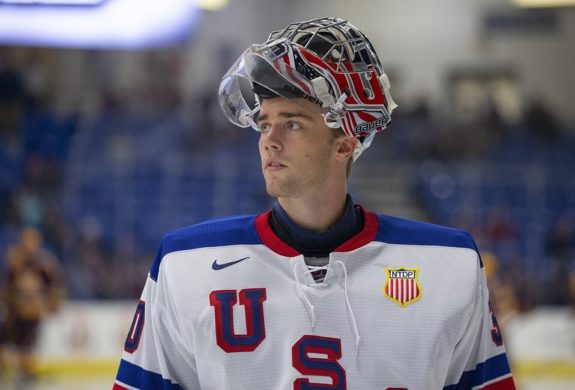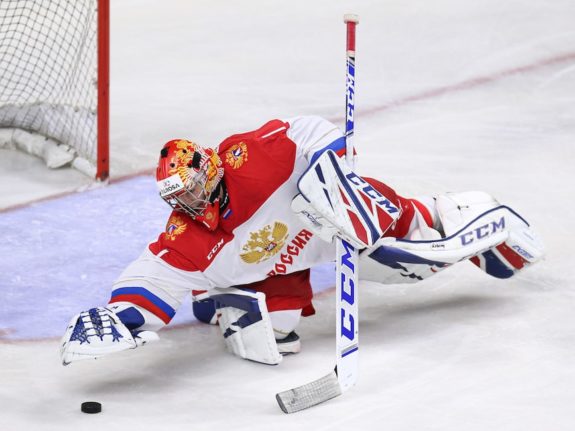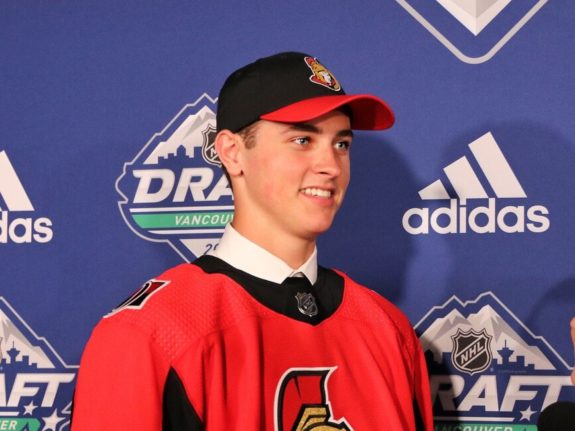- 2020 World Juniors: 10 Things to Watch
- 2020 World Juniors: Award Contenders
- 2020 World Juniors: Breakout Candidates & Sleeper Prospects
Canada overcame a ton of adversity to come out on top of the most competitive group in recent memory at the World Juniors.
It was much smoother sailing for Sweden — after getting past rival Finland in overtime on opening day — to finish first in the inferior group by extending their record to 52 straight wins in the preliminary round dating back to 2006.
Now comes the medal round, starting with Thursday’s quarterfinals that pit Canada against Slovakia, Russia against Switzerland, Sweden against the host Czech Republic, and the United States against Finland, while Germany faces Kazakhstan in the relegation round.
Medal Predictions
If the favourites advance, Canada would get a rematch with Russia in the semifinals — a chance to avenge that embarrassing 6-0 blowout — and Sweden would take on the young-but-mighty Americans in the other semi. That could set the stage for another Canada-USA showdown with gold at stake, while Sweden and Russia would battle for bronze.
That is how I see it playing out now, which is entirely different than the predictions I published on Boxing Day morning as part of my 10 Things to Watch piece. Expect the unexpected has become the theme of this tournament thanks to plenty of parity, but I’m still expecting the United States to walk away with gold — getting even with Canada for that opening defeat, regardless of whether Alexis Lafreniere returns — and I’d lean towards Russia over Sweden in the third-place game.
USA gold, Canada silver and Russia bronze, that’s my updated prediction going forward. For the record, I previously had the same three teams, but USA gold, Russia silver and Canada bronze.
AUTHOR’S NOTE: I missed the memo on the new IIHF playoff format for the medal round, moving away from the bracket style that we see in the NHL — and past World Juniors — by reseeding for the semifinals. Therefore, if the favourites advance from the quarterfinals, the semis would be Canada-USA and Russia-Sweden. In that case, I will stick with my original prediction of USA over Russia for gold, with Canada over Sweden (instead of Finland) for bronze. My apologies for the mix-up and any confusion it may have caused. This was news to many of us.
Awards Predictions
Cole Caufield finally lit the lamp with the overtime winner against the Czechs in Team USA’s preliminary-round finale — in classic Caufield fashion — but he’ll need to go on a tear in the medal round to win any individual awards since that was only his second point of the tournament (following an assist against Russia). I had Caufield winning the MVP and Top Forward, plus being named to the All-Star Team, but his slow start and strange deployment have those accolades looking like long-shots as of now.
The frontrunners for Top Forward include Caufield’s teammate Tevor Zegras, who leads the tournament in scoring with nine points (all assists and many of the highlight-reel variety), and Sweden’s Samuel Fagemo, who has the most goals with six thus far. Shane Pinto, also from the U.S., warrants mention among the top three, and Lafreniere likely would have been in the mix had he not hurt his knee in Canada’s second game.
Lafreniere was living up to my prediction as the Top Scorer when he went down, but that injury took him out of the running and perhaps out of the tournament. Zegras has a two-point lead on a group of six forwards, including Fagemo and Swedish teammate Nils Hoglander — who has scored the goal of the tournament by pulling off The Hog for a second time this season (also known as The Michigan and The Svechnikov, whatever you prefer to call those lacrosse-style goals) — plus Pinto and Patrik Puistola, who could also enter the Top Forward conversation if Finland manages to upset the Americans in the quarters. Fellow Finn Kristian Tanus and Switzerland’s Valentin Nussbaumer are the others with seven points. Canada’s leading scorers are captain Barrett Hayton and Dylan Cozens, both among six players with six points heading into the medal round. That also includes Russia’s Kirill Marchenko, Arthur Kaliyev of the U.S., and Swiss teammates Matthew Verboon and defenceman David Aebischer.

I’m still liking my prediction for Top Defenceman — that being a repeat winner in Russia’s Alexander Romanov, who has been a beast at both ends through the preliminary round. Finland’s Ville Heinola might be his biggest challenger, but Sweden also has a couple contenders in Nils Lundkvist and Victor Soderstrom. Canada and the United States haven’t had a real standout on defence, but Kevin Bahl has impressed for Canada and Zac Jones continues to play a big role for the Americans. Those teams are defending by committee for the most part.
The Top Goaltender is still to be determined in the medal round. There aren’t any leading candidates at this point, with most the starters experiencing mixed results. Sweden’s Hugo Alnefelt might have a slight edge based on his perfect record from the weaker group, but Spencer Knight of the U.S. and the Russian tandem of Yaroslav Askarov and Amir Miftakhov are still in contention, along with Canada’s Joel Hofer and possibly Finland’s Justus Annunen. That award is far from being handed out, but it could be closer after the quarters.
That will also be the case for the Most Valuable Player and the All-Star Team. As of now, Fagemo might be the MVP ahead of Pinto and Zegras, but that is nowhere near decided. I still think Knight becomes a candidate if the Americans win gold.

My All-Star Team through the preliminary round would feature Alnefelt in goal, Romanov and Heinola on defence, Fagemo, Pinto and Zegras for the forwards. Feel free to disagree in the comments below.
Draft Eligibles
The 2020 draft class has been on full display, with Lafreniere reminding everyone that he is still the top prospect by producing that four-point, player-of-the-game performance in Canada’s tournament-opening win over the U.S. That was quite the statement for him and Lafreniere was also Canada’s best player — and most dangerous forward — in the first period against Russia before getting hurt early in the middle frame.
Quinton Byfield was getting some pre-tournament hype as Lafreniere’s closest competitor for first overall — with a few scouts taking that leap to rank Byfield ahead of Lafreniere prior to the World Juniors — but he has been a disappointment for Canada through the preliminary round. Byfield has yet to record a point and has a minus-4 rating with a couple poor penalties to his name.
Jamie Drysdale and Dawson Mercer don’t have any stats to speak of either, but they have been playing limited roles for Canada — as the seventh defenceman and a depth forward, respectively. Byfield started the tournament among the top-six forwards and had been getting power-play time, but his role has since diminished.
As for Byfield’s competition to be the second overall pick — and to be taken in the top five — Swedish forwards Lucas Raymond and Alexander Holtz have both been impressive. Raymond, who I still had ranked ahead of Byfield at second, has four points (two goals, two assists) after being questionable for the tournament due to a viral infection that sidelined him for a few weeks prior to the World Juniors. He has been shining in shaking off that illness, while Holtz has had the hot hand with three goals and five points, including the overtime winner against Finland on Boxing Day. Holtz has two power-play goals and can snipe a little like Patrik Laine.
Germany’s Tim Stutzle turned a lot of heads in passing the eye test as a top-10 prospect with the potential to crack the top five. He was fun to watch and was making things happen almost every shift despite only recording three assists through four games.

John-Jason Peterka was the other eye-catching German, scoring three goals (two on the power play, including this beauty) and getting several chances thanks to his speed and attacking style. Peterka, who goes by J.J., was very active in getting the scouts’ attention. He also had 16 penalty minutes due to his aggression but may have played his way into the first round.
Lukas Reichel had two points (one goal, one assist) in the preliminary round but was the least flashy of the three highly-touted Germans. Reichel was the least noticeable but still effective and projects as a second-rounder or certainly a top-100 pick.
Askarov, the Russian goaltender, didn’t get off to a great start in losing to the Czechs — and losing the net in the process — but he rebounded by stopping all six shots against the United States over 16 minutes of relief work, then stopped 22 of 23 shots in a 6-1 win over Germany to close out the preliminary round. Askarov’s shutout was spoiled with less than three minutes remaining in regulation and it remains to be seen whether he’ll be Russia’s starter in the medal round. His stats aren’t anything special — 2.57 goals-against average and .891 save percentage, hindered by that 4-3 defeat — but Askarov is a special talent and should be a top-10 pick.

Jan Mysak sure looks like a first-rounder — and a top-20 pick — with the Czech forward scoring on Askarov by firing a wicked shot over his glove off the rush. Mysak has been a catalyst, generating lots of chances and earning a nice assist against Canada en route to being named his country’s player of the game in that 7-2 loss. Those are his two points thus far, but Mysak should get a bigger role in the medal round after injuries to Jakub Lauko and Jan Jenik.
Simon Kubicek, a defenceman quarterbacking the Czech power play, has also raised his draft stock by producing three points (one goal, two assists). His goal came on a man advantage and he has been blasting away from the blue line with a booming shot.
Switzerland’s Simon Knak could be another riser, with two goals and a plus-2 rating through four games, including player-of-the-game honours in a 5-2 upset over Finland. Knak scored the 4-2 goal on a neat redirection in the third period to secure that win — and second place in that group by prevailing in their preliminary-round finale.
Both Kubicek and Knak are imports in the WHL for U.S. Division teams — Seattle and Portland, respectively. They are both projected for the middle rounds but could crack the top 100 thanks to their performances at the World Juniors.
Among the other top-100 candidates, Slovakian defenceman Samuel Knazko (one assist) has shown flashes despite his minus-7 rating, while Czech forwards Jaromir Pytlik (one assist) and Adam Raska (no stats but noticeable) could both step it up in the medal round. Czech goaltender Nick Malik was supposed to be the third-stringer but was thrust into action against Canada when trailing 4-0 after injuries to Lukas Dostal and Lukas Parik. Malik stopped 19 of 22 in relief over 45 minutes. Russian forward Maxim Groshev is pointless through four games in a limited role — similar to Canada’s Mercer — but has gotten shifts late in games.
Three other defenders of note for the later rounds are Slovak Marko Stacha (one assist in two games with an even rating), and Czechs Karel Klikorka (two assists) and Radek Kucerik (six penalty minutes).
Breakout Candidates & Sleeper Prospects
I did a pretty good job of highlighting a few breakout candidates and sleeper prospects for each of the 10 countries. Where to start? How about with defending champion Finland, who has been getting significant contributions from Carolina third-rounders Puistola and Anttoni Honka as well as undrafted forwards Kristian Tanus and Joonas Oden. I shone the spotlight on those four, among others, and they haven’t disappointed.
From the United States, Pinto was the first name I mentioned as a breakout candidate, along with Zac Jones and Jordan Harris on defence (both have been good). Parker Ford has been buzzing at times but hasn’t shown up on the scoresheet as a sleeper prospect and Bobby Brink hasn’t broke out because the opposition has been trying to break him — being on the receiving end for some of the tournament’s biggest hits of the preliminary round.

From Russia, my top two breakout candidates were defenceman Daniil Zhuravlyov and Marchenko — both are playing prominent roles — while Pavel Dorofeyev and Egor Zamula have also proven worthy of my shout-outs.
From Canada, Calen Addison, Raphael Lavoie and Hofer have been the best of my breakout candidates — better than Jacob Bernard-Docker, Akil Thomas and Aidan Dudas thus far. Nico Daws struggled in getting pulled against Russia after also allowing four goals in the opener against the United States, so his stock took something of a hit as a sleeper prospect.
From Sweden, I had Hoglander and Karl Henriksson (one goal, two assists) as my top two breakout candidates, with both living up to my lofty billing. I didn’t get too high on the undrafted forward trio of Hugo Gustafsson, Linus Nassen and Linus Oberg as sleeper prospects and none of them have jumped out at me yet.
From the Czechs, I led with Lauko and Jenik, who both got hurt, but I also mentioned Michal Teply, Matej Blumel and Karel Plasek, who have had their moments as breakout candidates. I even dropped the name of undrafted captain Libor Zabransky, who has scored four goals as a defenceman (including two against the U.S. and one against Canada). I also had Kubicek as my top sleeper prospect among the Czech blueliners.
From Germany, I was pumping Peterka’s tires as a potential first-rounder and I was fairly high on Nino Kinder as a breakout candidate. I had overager Yannik Valenti among the sleeper prospects and he has been decent too.
From Slovakia, I called Oliver Okuliar (one goal, two assists) and Martin Fasko-Rudas (one goal, one assist) as breakout candidates. I am familiar with both of them as WHL imports and they have certainly been chipping in for the Slovaks.
From Switzerland, I led with Nussbaumer as my top breakout candidate and Knak as the sleeper prospect, so those were both hits. Aebischer and Verboon were mentioned as fitting the bill for both categories.
From Kazakhstan, I wasn’t too sure what to expect but had Oleg Boiko (one goal, one assist, even rating) and Maxim Musorov (four goals, even rating) as my breakout candidates, with Artyom Korolyov (six penalty minutes) as my sleeper prospect.
There honestly haven’t been many surprises or revelations for me in watching this year’s tournament, though Slovakia’s Robert Dzugan (four goals) and Switzerland’s Fabian Berri (two goals, both against Finland) are two forwards that weren’t on my radar but have been showing up on the scoresheets. They are among the players that I’ll be watching a little closer when the puck drops on the medal round. Stay tuned!
Who do you got the rest of the way — for the medals and the individual awards? Any players surprising you — good or bad — by standing out more or less than you expected?